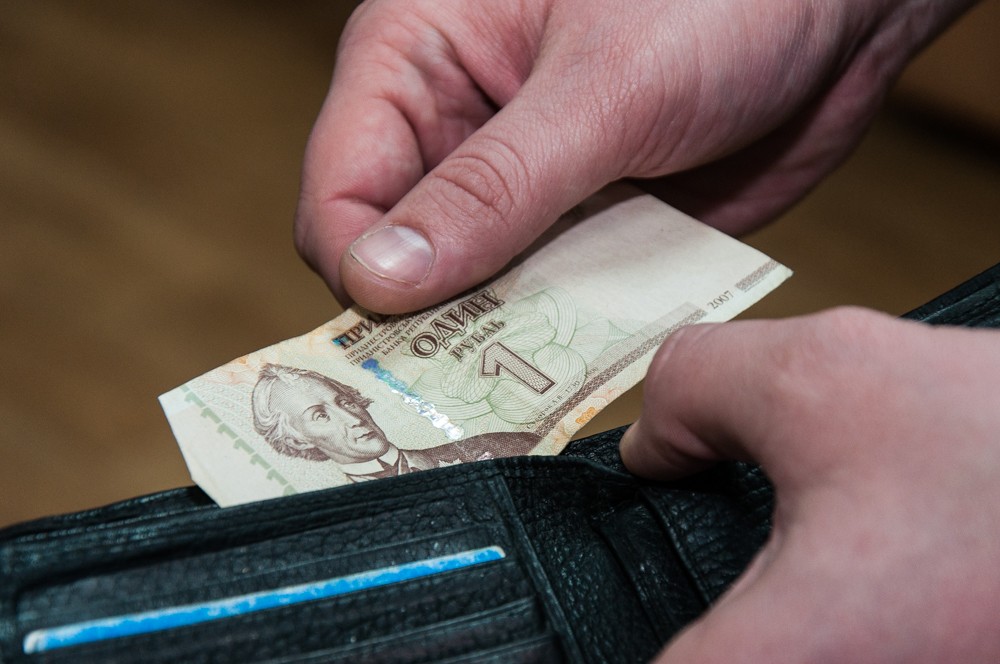From the very start the main problem has been the deficit of the government's coffers and sources for covering it. Some have called the deficit «unprecedented». However, it is only fair to say that the in the past 10 years, including the period before 2012, Pridnestrovie has always had a very high budget deficit, amounting to 40% and even 50%. It is understood it has not been covered with foreign loans because Pridnestrovie cannot rely on them due to its unrecognised status. It is reasonable to infer, therefore, that the main and virtually only source of covering remains a special gas account, which accumulates natural gas payments. One might say, however, that the account has also fallen short of money as gas tariffs for both enterprises and the population have been lower than the contract price. And they are still lower.
Getting ahead, we may note that the gas account is continuing to decrease in today's conditions. There are several reasons for that. First, oil, hence gas, prices have dropped. Second, it is no secret that the situation has been deteriorating for the Pridnestrovian industry since 2014 — some enterprises has begun to work only part-time, others have received state support in the form of reduced energy tariffs to stay afloat.
In the meantime, Pridnestrovie's budget receipts are also falling due to the general devaluation of currencies, a drop in contract price for Pridnestrovie's electric power supplied to Moldova and other factors. In other words, the budget is more than ever in need of «support» from the special gas account, but the capabilities of this source are also shrinking.
This very 'deficit' again
Let us get back to a huge, unprecedented, in the words of the chair of the parliamentary economic committee, Alexander Martynov, deficit of the state budget. The deficit was really serious — in the initial draft of the 2016 budget it amounted to over 1 billion roubles only on social protection items. The question is why?
The roots of this situation dates back to 2014 when the 2015 budget was being discussed. Prior to that the Supreme Council had rejected a concept for 2015 and medium-term budget and tax policy, which made a tax reform, which was supposed to balance the economy's burden and create conditions for budget replenishment, impossible.
Vladimir Artemenko, the then minister of economic development, pointed out a huge 40% deficit of the state's coffers when advocating the necessity of the tax reform and noted that state of affairs only existed in underdeveloped countries.
The year of 2014 brought a lot of problems to the PMR: Ukraine's civil war complicated the logistics for Pridnestrovian exporters, national currencies began to devalue in neighbouring countries. Demand for our goods was down. Based on the developments, it was clear that the crisis would last longer than a year, that budget revenues would continue shrinking.
In that context the Supreme Council passed the republican budget with an unprovided deficit on social protection items. Even then the deficit amounted to 555 million roubles. In addition, there was an unprovided deficit of the Unitary Social Insurance Fund, which appropriate funds for pensions.
Negative forecasts came true early in 2015 when tax revenues were the lowest over the past several years. In February 2015 they were down 35% as compared to the same period in 2014.
Covering budget «holes» in social protection items required 90 million roubles a month, although it was evident then that borrowed funds were not sufficient to pay wages and pensions. As a result, after the first two months of 2015 it was necessary to make a decision about a 70% appropriation for social payments. The situation was exacerbated by a Moldova-EU association agreement looming over Pridnestrovie and a threat to lose the European market, which was dismissed only in December. Under such circumstances there was a need for some safety cushion, which was accumulated throughout 2015 (and which was later used to pay off pension debts).
Summing up, the current financial situation and the growth of the budget deficit haven not been caused only by the foreign economic downturn and a drop in budget receipts, but also by the parliament's decisions, which set huge unprovided budget in 2014,
Responding to lawmakers' allegations that the government has drafted the 2016 budget with an unprecedented deficit, we can say that the role of the Supreme Council in setting the budget can hardly reduce to criticism. However, some economics scholars believe that this role may be even primary — it is the legislative body that debates and approves the budget and economic policy, and the executive power implements it. Putting the blame for the budget deficit on the government is the easiest thing to do, but is it correct?
We can argue in the same way that our public sector is too large for the volume of our GDP. Needless to say, it should be reduced wherever it is possible (creating jobs in other sectors instead not to leave people «in the street»). But at the same time, it is understood that despite its small size Pridnestrovie must have a full-fledged state system, law enforcement and defence bodies. It requires sufficient spending.
In former times there used to be another way of reducing a budget deficit — to lower the value of the Pridnestrovian rouble against the US dollar. In the past four years Pridnestrovie has avoided such measures, which woud mean the reduction of a budget deficit at the expanse of falling living standards. And back in 2011, for example, there was a decree by former president Igor Smirnov «On guidelines for drafting the 2012 budget» which provided for the average exchange value in 2012 at 12 roubles per $1.
Which is more harmful than good?
In the past two years the government has not had a lot of leverage to respond to the crisis. The country has no funds to pump directly into the economy. The Supreme Council rejected an anti-crisis programme, submitted to the government in early 2015. It was evidently done on the ground that the programme might affect the interests and profits of big business and retail chains.
Among other things, there was a paragraph providing for the expansion of a list of food products whose prices could be controlled by the government. This list was supposed to include beef, pork and chicken, fresh fish and chilled herring, sugar and salt, black tea, potato, white cabbage, onion, carrot, beet root and apples, and some dairy products. The government advocated that the maximum markup for them was no higher than 30% of their purchase price.
The Supreme Council did not agree to that and proposed a vague scheme providing for state regulation for the period of no longer than three months and only on condition that a monthly rise in prices was as high as 30%. That is to say, had prices grown, say, by a quarter over a month, which is also very much, state regulation would not have applied.
By the way, a similar paragraph on food products is in the latest version of the anti-crisis programme which the president submitted to the Supreme Council in early March. And again MPs say price control will «do more harm than good»…
The parliament has not proposed any «breakthrough” anti-crisis initiatives so far. But at the same time, newly elected lawmakers have started with the establishment of institutional awards and an «efficient» trip to Moscow, as well as with people's deputy's requests which for the present serve to dismiss rumours.
Sergey Gorchakov








